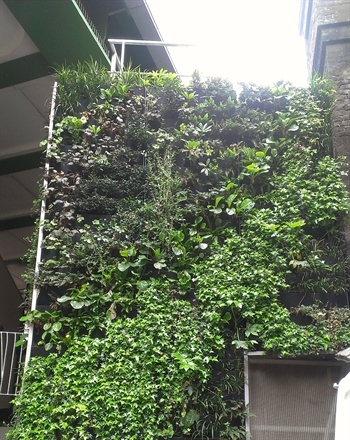
Aaron Burton
The Greater London Authority's work on water supply and stormwater policy is not so different from the Chicago region's.
When I think about Europe and issues of water (well, most issues, really), I think of places like Malmo, Sweden, that are so far ahead of any U.S. city that I am hard-pressed to imagine a path from here to there. However, since attending the International Water Association’s Specialist Conference on Efficient Use and Management of Water in Paris October 2013 and meeting with a number of water professionals in London on my vacation last week (yes, that’s what I do on vacation), I was struck by how similar the water issues Chicago faces are to those of leading world cities.
According to Peter Massini, Urban Greening Team Leader at the Greater London Authority (GLA—the regional planning agency for London, similar to the Chicago Metropolitan Agency for Planning, or CMAP), “The technical stuff is the easy part. We’ll keep innovating and figure new technologies out. The real barrier to progress is governance and politics.”
So, despite the very different government systems and water ownership configurations between London and Chicago, Massini, umprompted, confirmed my feelings about where we need to focus our efforts.
As Mayor Boris Johnson walked by a few feet away from us with bike helmet on for his evening commute (living up to his namesake Boris bikes), Massini and I continued to compare notes about water policy in greater London and greater Chicago.
A big difference between the two cities is ownership. In the Chicago region, public utilities own and manage most drinking water and sewer systems. In London, Thames Water is a private entity that runs both drinking water and sewer systems, much like Illinois American Water (the private utility in a handful of Chicago suburbs). This theoretically allows Londoners to better invest in their system as an asset and pay for the full-cost of water, something that appears politically impossible with our predominately publicly-owned utilities. In practice, it’s a very complicated balancing act to meet the demands of customers, the requirements of Ofwat, the national agency that regulates the rates Thames Water charges, the environmental regulations handed down by the Environment Agency and the European Union Water Framework Directive and the financial demands of Thames Water’s investors. That said, much like Chicago is using Clean Water Initiative money to replace our century-old water mains, Thames Water is also embarking on an intensive plan to replace their Victorian-era water mains.

Living green walls and green roofs are increasingly a solution with multiple benefits throughout London, like this green wall outside Borough Market.
Abby Crisostomo
Further complicating things is the fact that London has combined sewer systems just like Chicago does, which means that wastewater utilities must also manage stormwater. Similar to Chicago’s Tunnel and Reservoir Plan, London is building its own massive tunnel system, the Thames Tideway Tunnel Project, to handle stormwater. In both cities, experts question whether massive tunnels are enough to handle localized flooding problems, particularly in light of new climate projections. On both sides of the pond, most agree green infrastructure needs to be part of the solution.
Just like in the Chicago region, though, disparate ownership and governance makes it difficult to induce the use of green infrastructure. Thames Water may own the pipes and be responsible for treating the water, but the land where rain falls is still privately owned. When property owners experience flooding they tend not to call Thames Water, but instead their Local Council, one of 32 local governments that manage individual boroughs within London (think of them like Chicago’s 50 wards, but with the independence of individual suburban governments).
And so the problem of decentralized solutions like green infrastructure is an even more difficult one in London than in Chicago. If London fails to meet UK or EU water quality standards, it’s difficult to determine who is responsible; whereas in the U.S., as imperfect as consent decrees may be, at least there is a responsible party, such as the Metropolitan Water Reclamation District of Greater Chicago.
Interestingly, unlike in Chicago, London does not have a robust third sector of non-profit organizations working on water policy solutions. While the GLA does fantastic policy work—such as their recent green roofs and walls guidance and their upcoming long-term infrastructure investment plan—just like CMAP, they have no authority to implement these policies and instead rely on the local governments to act on them. As we know from our own region’s experience, this decentralized political system leads to great disparities in adoption of policies consistent with the plan.
In the U.S., organizations such as ours, the Metropolitan Planning Council, exist to ensure good plans lead to best practices to help bridge that gap between all levels of government, local communities and private entities. For stormwater in Chicago, we’ve kicked off facilitation of the Calumet Stormwater Collaborative (if you missed our roundtable last week on collaborative stormwater solutions, watch it online!). The Collaborative is an effort to get all the various entities that manage, regulate, fund and own stormwater infrastructure, both grey and green, to coordinate goals and collaborate on solutions. Visit our website to learn more about MPC's work to improve both policies and governance in the Chicago region on stormwater and water supply.